Understanding the Facts About Vaccines and Autism
Amid widespread concern and misinformation, this article aims to clarify the relationship, or lack thereof, between vaccines and autism spectrum disorder (ASD). By examining rigorous scientific research, official health guidelines, and common misconceptions, we present a comprehensive overview to inform the public and dispel myths.
Historical Background and the Discredited Wakefield Study
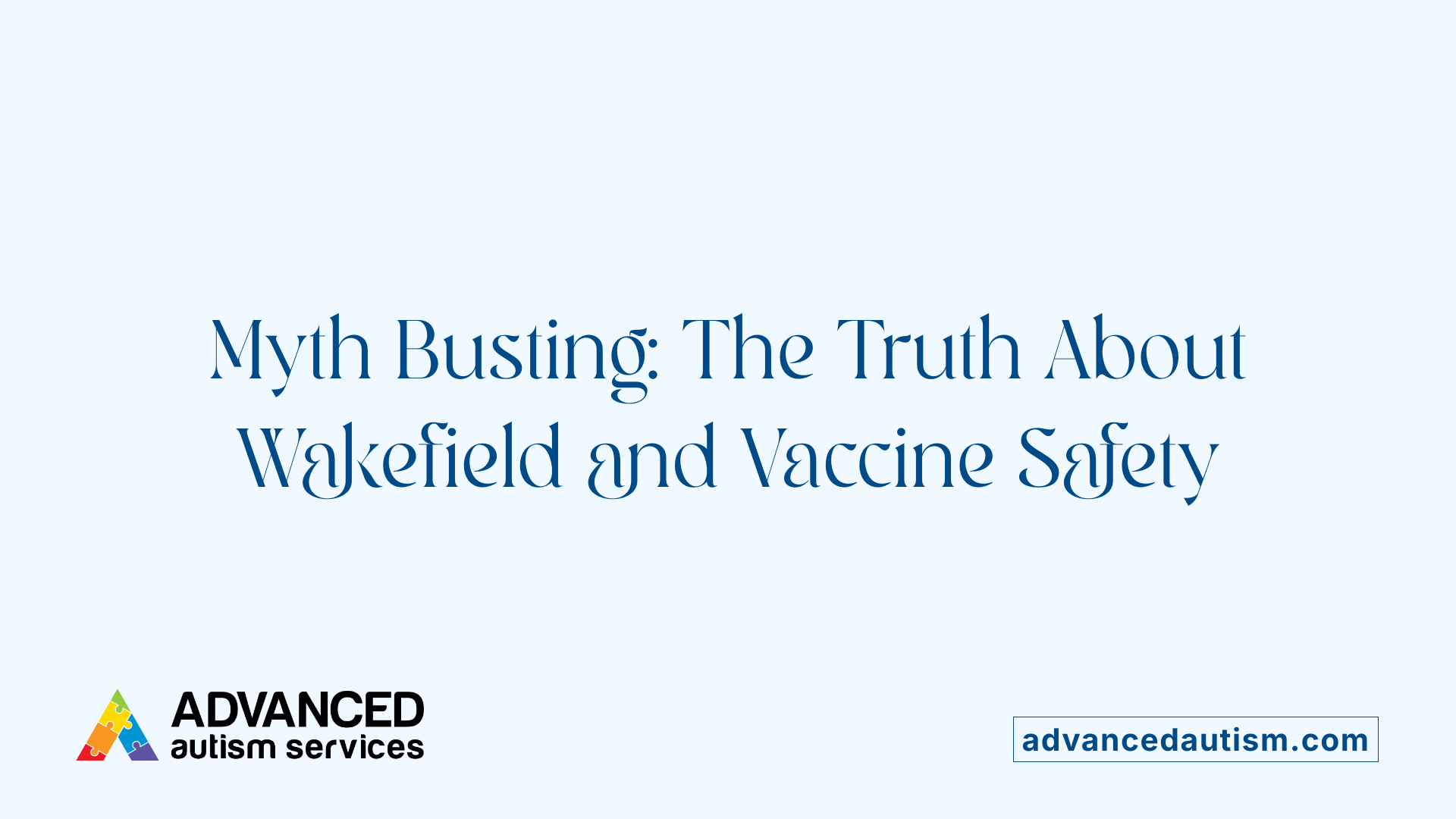
Initial concerns about vaccines and autism raised in 1998 by Wakefield
In 1998, a doctor named Andrew Wakefield published a study that claimed a possible link between the MMR (measles, mumps, and rubella) vaccine and autism. This study received widespread attention and sparked fears among parents, leading to a decline in vaccination rates in various countries. Wakefield suggested that the vaccine might cause autism by affecting the immune system, which led many to worry about vaccine safety.
Flaws in the original study
However, this study was based on a very small sample size and relied on anecdotal evidence. Investigations revealed that the data was flawed, and the methodology was not scientifically sound. It was also discovered that Wakefield had conflicts of interest and had manipulated data to support his claim. These issues compromised the integrity of the research.
Further scrutiny showed that the study's findings were not reproducible and lacked scientific rigor. Multiple large studies involving hundreds of thousands of children have since shown no link between the MMR vaccine and autism.
Retraction and repercussions
In 2010, the medical journal that published Wakefield's study officially retracted it, citing ethical violations and scientific misconduct. Wakefield lost his medical license and was banned from practicing medicine in the UK. Despite this, some misinformation persisted, influencing vaccine hesitancy among certain groups.
Extensive research over the past two decades has conclusively shown that vaccines do not cause autism. Large epidemiological studies from Denmark, the UK, and Canada involving hundreds of thousands of children consistently found no association between vaccines containing thimerosal or the MMR vaccine and autism spectrum disorder.
In summary, the initial concern about vaccines and autism was based on a now-debunked and discredited study. The scientific community overwhelmingly agrees that vaccines are safe and do not increase the risk of autism.
| Aspect | Details | Additional Information |
|---|---|---|
| Year of original study | 1998 | Published by Wakefield et al. |
| Main flaw | Small sample, ethical issues, misconduct | Led to retraction and sanctions |
| Status of the study | Retracted in 2010 | Discredited and considered invalid |
| Current consensus | Vaccines do not cause autism | Supported by large international studies |
| Major studies | Over 95,000 and 650,000 children | Found no increased autism risk |
| Main vaccines studied | MMR and thimerosal-containing vaccines | No causal links identified |
Scientific Evidence and Epidemiological Studies
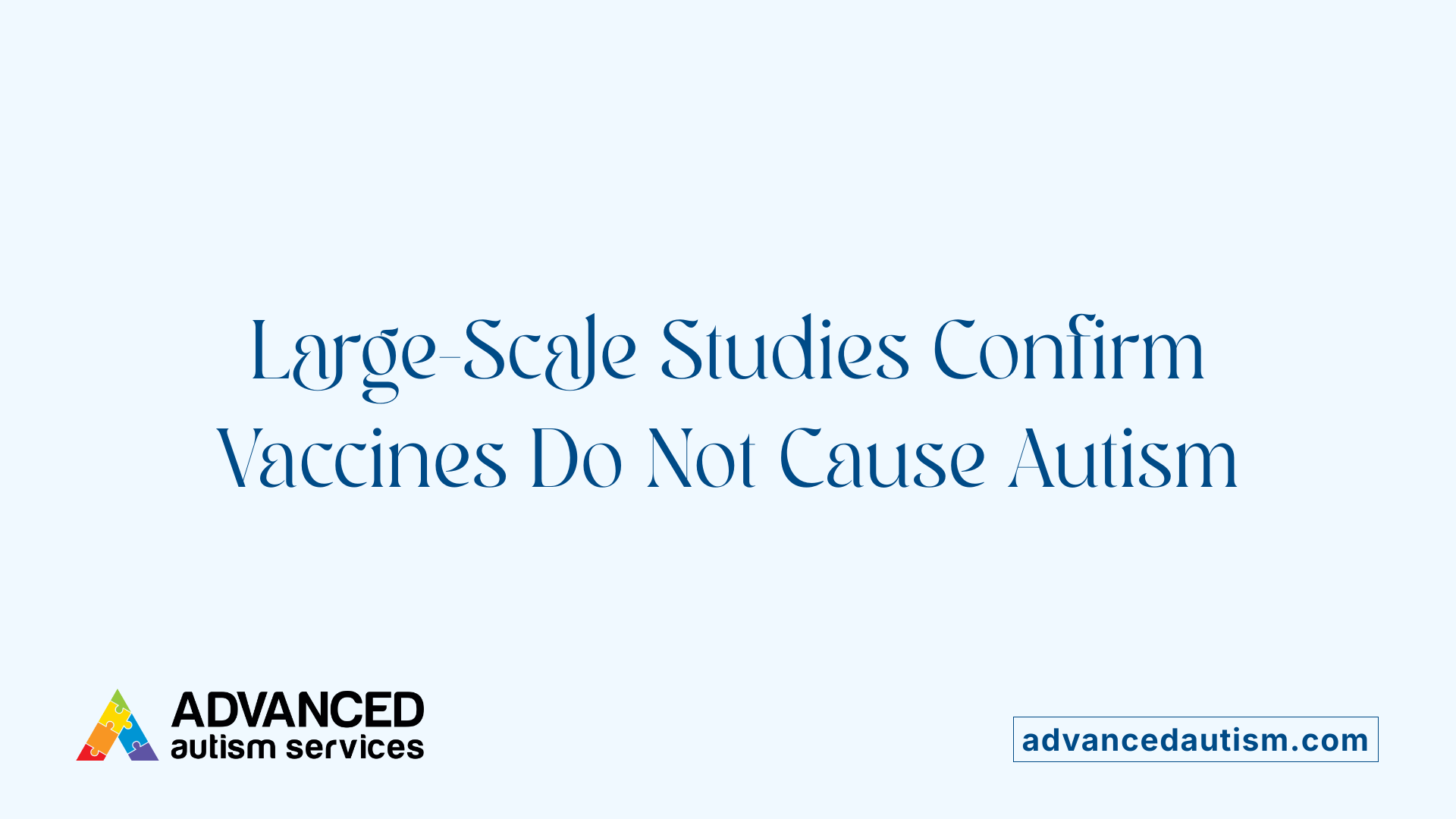
Large-scale studies on MMR and autism
Numerous extensive studies have investigated the potential link between the MMR vaccine and autism. Notably, research involving over 95,000 children in Denmark and more than 650,000 children in the UK found no increased risk of autism associated with this vaccine. These large datasets provide strong evidence that MMR vaccination does not contribute to autism development.
Studies involving over 95,000 and 650,000 children
Research with vast populations ensures reliable results. For example, the Madsen et al. study in 1998 examined over half a million children and found no correlation between vaccination and autism. Similarly, UK studies with 650,000 children reinforced that timing or receipt of the vaccine has no impact on autism risk.
Research from Denmark, the UK, and Canada
Multiple investigations from different countries consistently support these findings. Studies from Denmark, the UK, and Canada have concluded that there is no evidence linking any vaccine ingredients, such as thimerosal, or the number of vaccines given to autism. They also show that rates of autism have not increased with vaccination programs.
No evidence of causal links
Despite early theories, there is no scientific proof that vaccines cause autism. The initial hypothesis was based on a flawed study published in 1998 by Andrew Wakefield, which was later retracted due to misconduct. Follow-up studies, including meta-analyses, continue to affirm that no causal relationship exists between vaccines and autism.
The role of genetic and prenatal factors
Research indicates that autism is heavily influenced by genetics, with twin studies showing a 60-92% concordance rate in identical twins. Prenatal factors such as maternal health, birth complications, and environmental exposures also contribute more significantly to autism than vaccines. These insights highlight that biological and environmental influences, rather than immunizations, are pivotal in autism spectrum disorder development.
| Study Type | Population Size | Main Finding | Additional Notes |
|---|---|---|---|
| Danish Cohort Study | Over 95,000 children | No link between MMR and autism | Large, comprehensive epidemiological data |
| UK Study | 650,000 children | No increased autism risk | Examined vaccination timing |
| Canadian Study | Various regions | No association between vaccines and autism | Focused on vaccine ingredients |
| Meta-Analysis | Multiple studies | No causal relationship | Reinforces consistent findings |
Overall, the evidence confirms that vaccines, including MMR and those containing thimerosal, are safe and do not cause autism. Ongoing research continues to support these conclusions, emphasizing that autism largely results from genetic and prenatal factors rather than vaccination.
Vaccine Ingredients and Safety Evaluations
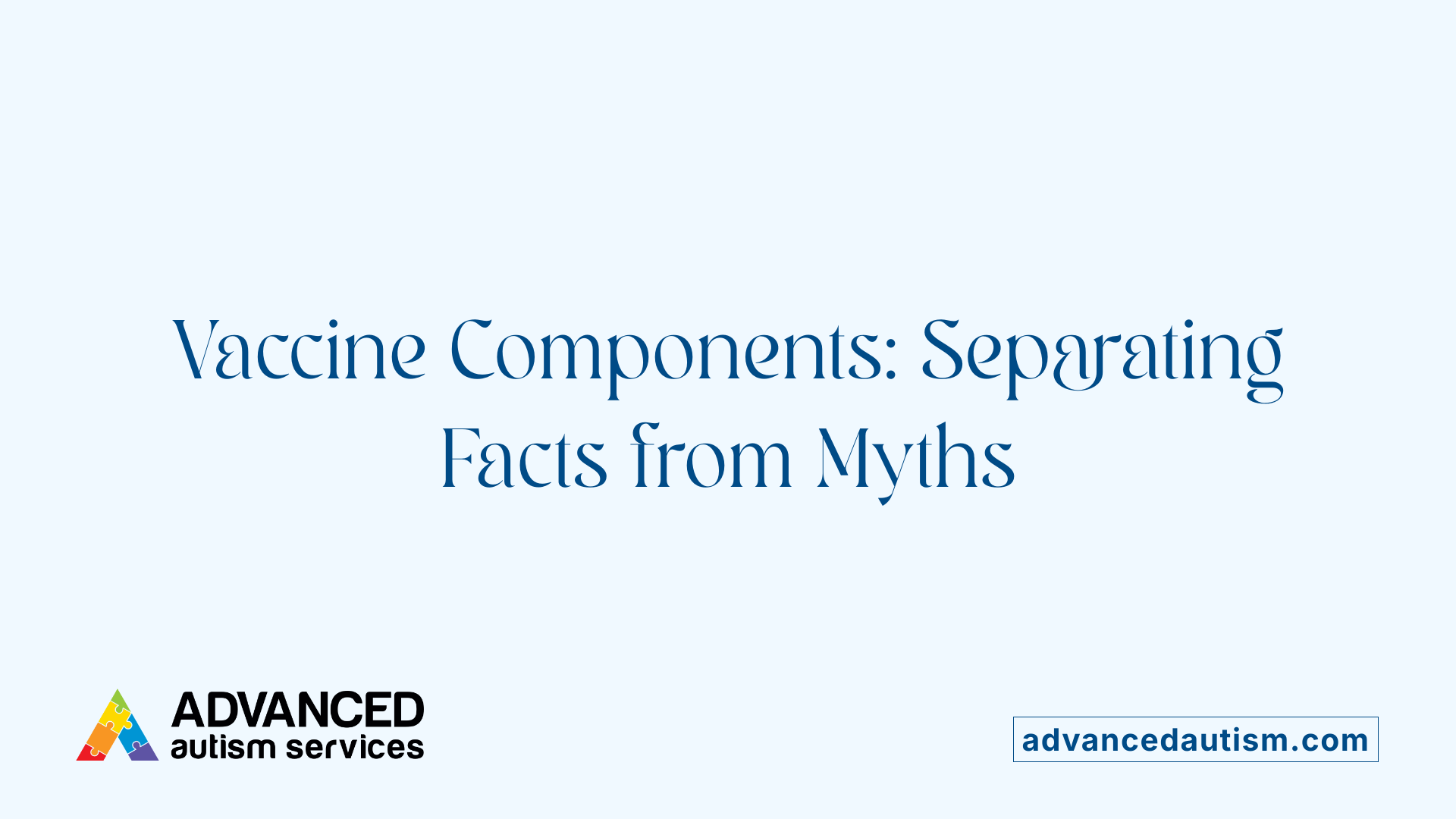
What should the public know about autism causes and vaccine safety?
Public health research and extensive scientific studies have well established that vaccines are safe and do not cause autism. The early hypothesis linking the MMR vaccine to autism originated from a 1998 study by Andrew Wakefield, which has since been discredited due to scientific misconduct and was officially retracted. This flawed research led to widespread misconceptions, but subsequent large-scale investigations have consistently shown no connection between vaccines and autism.
Epidemiological studies from countries including Denmark, the UK, and Canada have examined hundreds of thousands of children and found no increased risk of autism associated with vaccination. These studies looked specifically at vaccines containing thimerosal, a mercury-based preservative, as well as the composition of vaccine antigens, and found no evidence supporting a causal link.
Research into vaccine ingredients such as thimerosal and antigens has repeatedly shown that they do not cause autism. Thimerosal was removed from most vaccines in the early 2000s as a precaution; however, autism rates have continued to rise, further indicating no connection.
In addition, biological studies demonstrate that autism can often be identified early—sometimes even before vaccination—based on behavioral signs and brain structure variations. Genetic factors are now understood to play a prominent role in autism, with research indicating that approximately 15-20% of cases are linked to specific gene variants.
Environmental influences, such as parental age, prenatal health, and exposure to certain drugs or pollutants, have also been associated with autism risk, further distancing the condition from vaccines.
Overall, health authorities like the CDC, American Academy of Pediatrics, and American College of Obstetricians and Gynecologists affirm that vaccines are both safe and essential for preventing serious diseases. They emphasize there is no scientific evidence showing vaccines cause autism, and the myth linking the two has been thoroughly debunked by decades of research.
| Vaccine Component | Concerned Condition | Research Findings | Further Notes |
|---|---|---|---|
| Thimerosal | Autism | No link established | Removed from most vaccines by 2001 |
| Antigens | Autism | No association | Part of the immune response intended to protect |
| Preservatives | Autism | No evidence | Safety evaluated extensively |
| Overall vaccine adjuvants | Autism | No credible link | Widely tested and found safe |
In conclusion, the science overwhelmingly confirms that vaccines do not cause autism, and ongoing research continues to support their safety and importance in public health.
Genetics and Other Contributing Factors to Autism
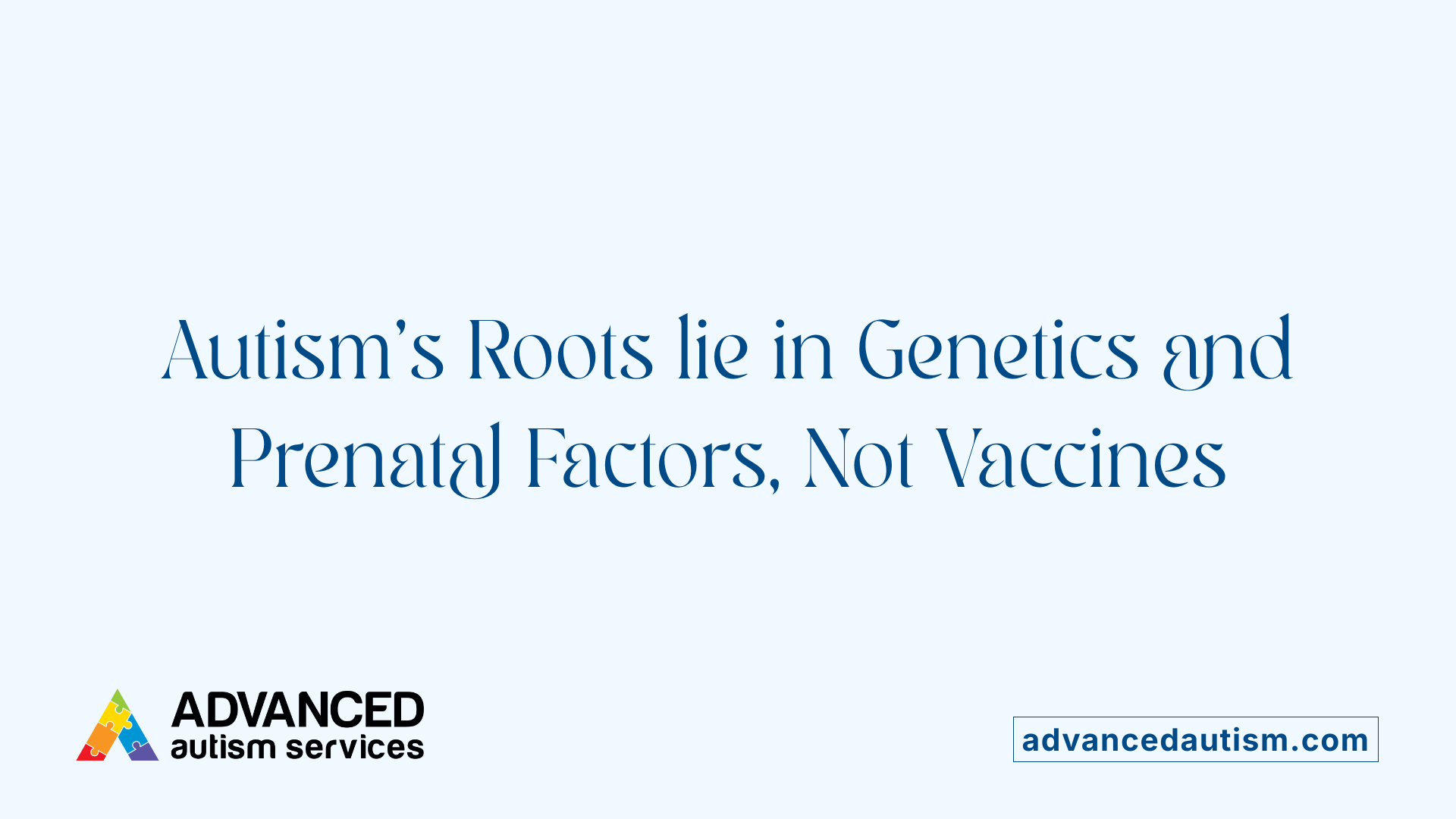
What does the scientific research say about the link between vaccines and autism?
Decades of scientific investigation have shown that vaccines do not cause autism. The initial concern was based on a 1998 study by Andrew Wakefield, which falsely claimed a link between the MMR vaccine and autism. This study was later retracted due to scientific misconduct and has been discredited.
Extensive research involving large populations across various countries supports this conclusion. For example, studies from Denmark, the UK, and Canada have analyzed hundreds of thousands of children and found no increased risk of autism associated with any vaccine, including those containing thimerosal.
Meta-analyses and reviews conducted by health organizations such as the Institute of Medicine and the CDC have reinforced these findings. They consistently show no causal relationship between vaccines and autism spectrum disorder (ASD). Moreover, studies have shown that the biological features of autism, such as abnormal brain structures, are observable before vaccination, indicating that autism develops independently of immunizations.
While some early hypotheses focused on vaccine ingredients like thimerosal, a mercury-based preservative, these claims have been thoroughly examined. Large-scale studies, including reviews by the Institute of Medicine, have concluded that thimerosal does not cause autism. Thimerosal has been removed from most childhood vaccines since the early 2000s without impacting autism rates.
In summary, the overwhelming scientific consensus is that vaccines do not cause autism. Autism’s primary origins are genetic, with environmental factors such as prenatal health, parental age, and other exposures contributing to risk. The narrative linking vaccines to autism has been thoroughly debunked through rigorous research and clinical studies.
Myths, Misconceptions, and Public Perceptions
Are there any myths or misconceptions about vaccines causing autism?
Many false ideas have circulated claiming that vaccines cause autism, but scientific research universally disproves these myths. The original concern stemmed from a 1998 study by Andrew Wakefield that suggested a link between the MMR vaccine and autism. However, this study was later found to be flawed, and its author lost his medical license. The paper was retracted, and its data deemed fraudulent.
Since then, numerous large epidemiological studies have been conducted across the globe, involving hundreds of thousands of children. These studies consistently show no connection between vaccines—including those containing thimerosal, a preservative once used in some vaccines—and autism spectrum disorder.
Health organizations such as the CDC, WHO, and the American Academy of Pediatrics affirm that vaccines are safe. Minor side effects like fever or rash are common, but serious adverse reactions are exceedingly rare. Vaccines protect individuals and communities by preventing serious illnesses, and scientific evidence advocates for their continued use.
The belief that vaccines cause autism persists despite overwhelming evidence to the contrary. This misconception influences some parents to delay or refuse vaccinations, increasing the risk of outbreaks of preventable diseases. It is important to rely on credible information and scientific consensus that vaccines do not cause autism and are safe for children.
| Misconception | Scientific Findings | Source | Impact of Misinformation |
|---|---|---|---|
| Vaccines cause autism | No evidence supports this claim | Multiple studies (e.g., Madsen et al., 1992; CDC, 2014) | Contributes to vaccine hesitancy |
| Thimerosal in vaccines causes autism | No causal relationship found | Institute of Medicine, 2004; CDC studies | Leads to removal of thimerosal without affecting autism rates |
| MMR vaccine triggers autism | No link found in large-scale research | Danish, UK, Canadian studies | Creates unfounded fears and decreased immunization |
Overall, ongoing scientific research continues to reinforce that vaccines are vital, safe, and do not cause autism, helping to dispel harmful myths.
The Importance of Vaccination and Public Health
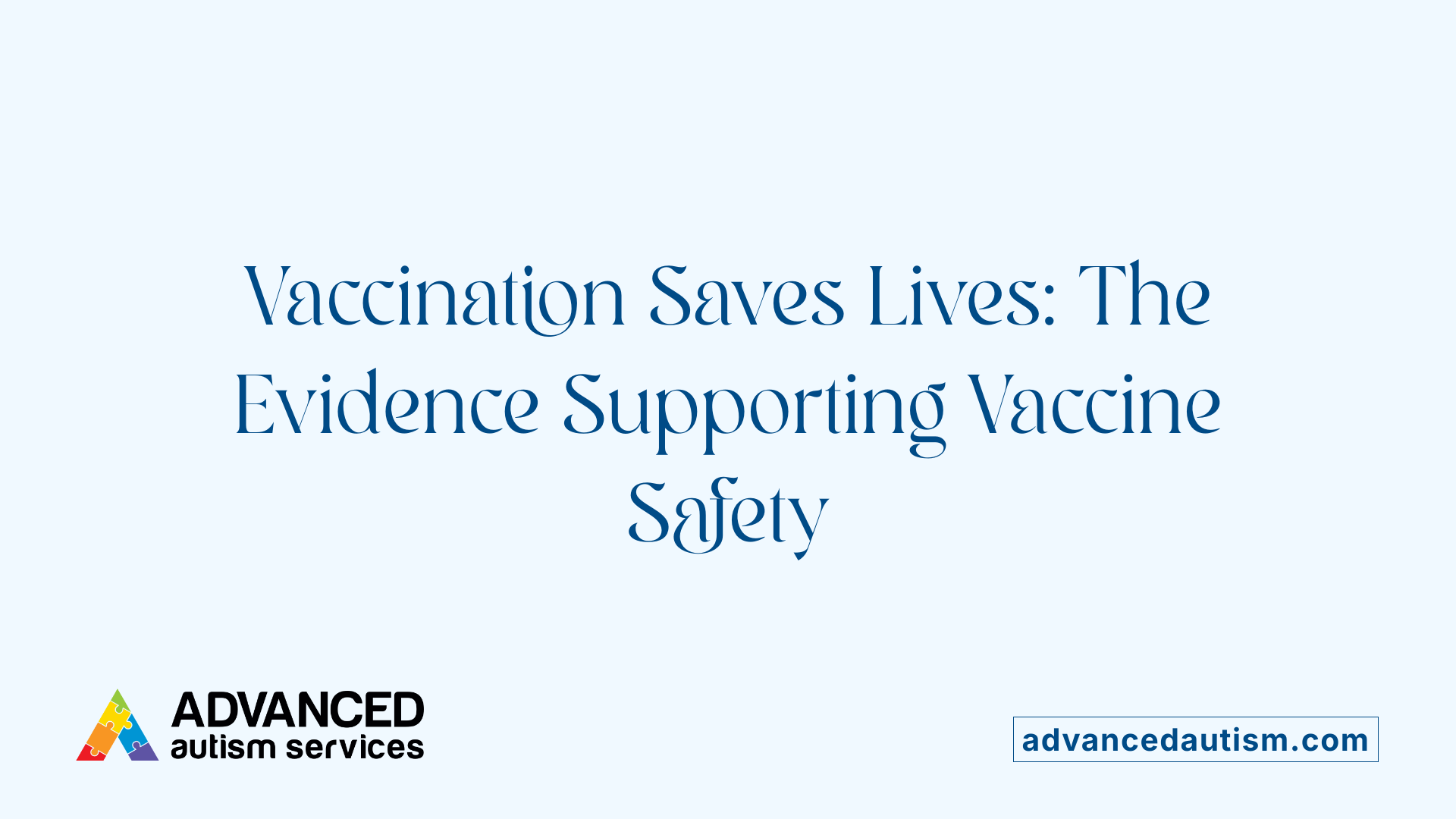
What should the public know about autism causes and vaccine safety?
Extensive scientific research has thoroughly examined the relationship between vaccines and autism, and the evidence consistently supports vaccine safety. The initial concern raised by a 1998 study linking the MMR vaccine to autism was later proven to be flawed and fraudulent. This study was retracted, and its author faced professional sanctions.
Numerous large-scale epidemiological studies from countries like Denmark, the UK, and Canada, involving hundreds of thousands of children, have found no evidence of a connection between vaccines—such as those containing thimerosal or multiple antigens—and autism spectrum disorder (ASD). These studies also show that the timing or number of vaccines administered does not increase autism risk.
Modern understanding points to genetic factors and early developmental markers as more relevant to autism than vaccination. Signs of autism can often be observed before children receive their vaccinations. Health organizations, including the CDC, American Academy of Pediatrics (AAP), and American College of Obstetricians and Gynecologists (ACOG), agree that vaccines are safe and essential in preventing serious diseases.
In summary, the prevailing scientific consensus is that vaccines do not cause autism. They are a vital public health tool that protects individuals and communities from preventable illnesses, underscoring the importance of accurate information in making health decisions.
Why accurate scientific communication matters
Misinformation about vaccines can lead to hesitancy and reduced immunization rates, risking outbreaks of preventable diseases. Clear, evidence-based communication from health authorities helps foster trust and encourages vaccination, ultimately saving lives and promoting community well-being.
| Topic | Findings | Additional Details |
|---|---|---|
| Vaccine safety | Extensive studies show vaccines are safe and effective | No credible link to autism, includes studies on preservatives |
| Autism causes | Mainly genetic and early developmental factors | Signs often present before vaccination |
| Misinformation risks | Leads to vaccine hesitancy and outbreaks | Misinformation spread despite scientific consensus |
| Public health importance | Vaccines prevent serious, sometimes deadly illnesses | Key component in maintaining community health |
Reinforcing the Truth About Vaccines and Autism
The overwhelming scientific evidence confirms that vaccines do not cause autism. Myths and misconceptions fueled by discredited studies have been thoroughly debunked. Vaccination remains one of the most effective public health strategies to prevent serious infectious diseases and protect communities worldwide. Maintaining transparent communication and based on robust scientific research is crucial in fostering public trust and ensuring high vaccination coverage for current and future generations.



